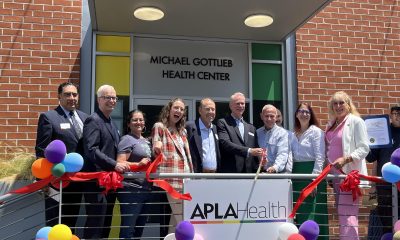Events
GuadaLAjara film festival in Los Angeles
The GuadaLAjara Film Festival announces this year’s Arbol De La Vida Humanitarian Lifetime Achievement Award recipient, Bamby Salcedo
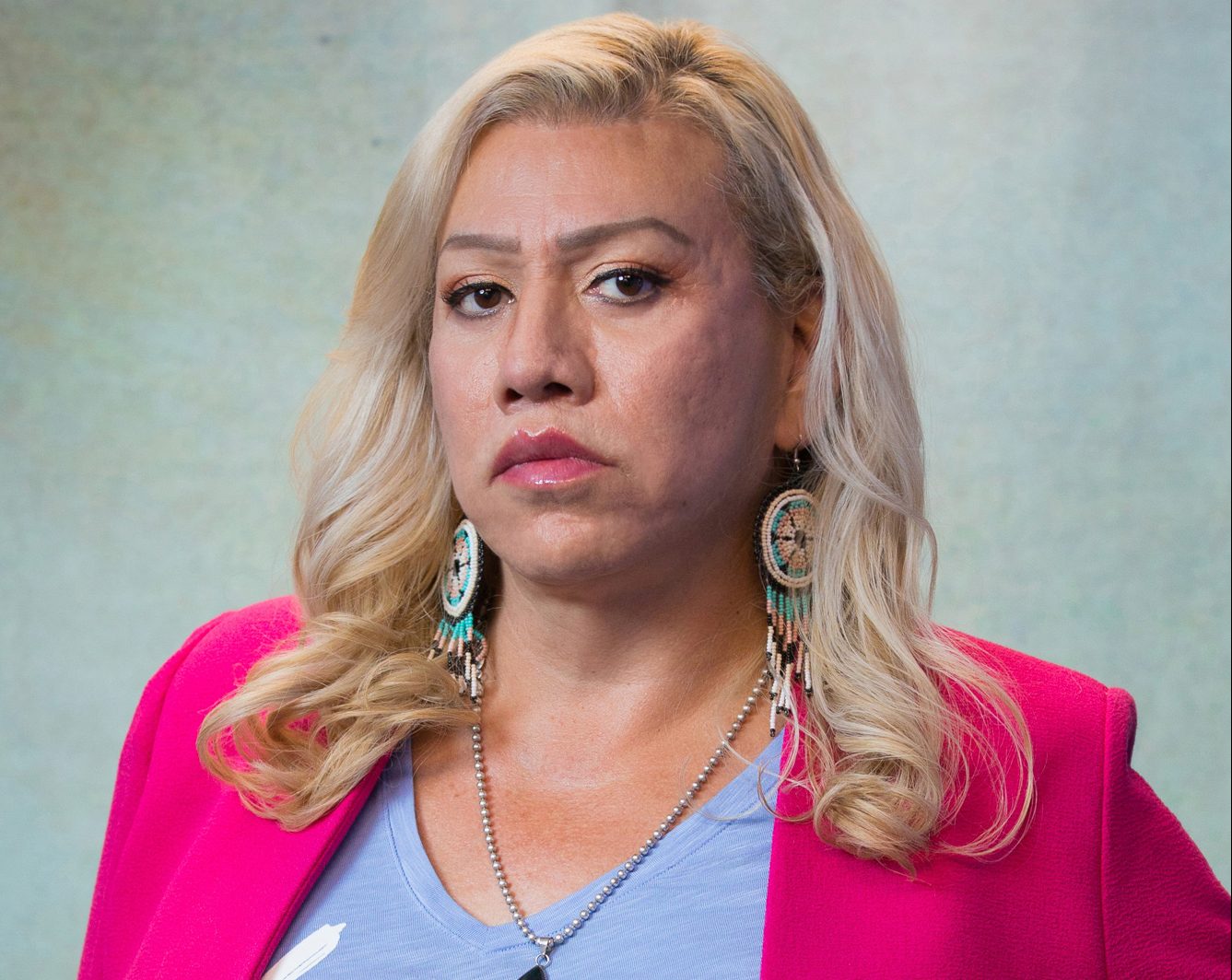
LOS ANGELES- The GuadaLAjara Film Festival in Los Angeles (GLAFF), which every year aims to showcase the best of Latinx/e, Latin America and BIPOC cinema as well as serve as a bridge that unifies and connects diverse stories and experiences with the intention of fostering a borderless film industry, announces the upcoming 12th Edition which will be taking place in Downtown Los Angeles from September 29th through October 1st, 2022.
In line with GLAFF’s mission of building bridges between the two industries, the programming will include films by Latin American filmmakers that were showcased at their sister festival, the 37th Guadalajara International Film Festival held this past June in Guadalajara, Mexico and a special curated selection of films from Latinx/e and BIPOC filmmakers in the United States.
“This year the GuadaLAjara Film Festival continues with our mission of building bridges and strengthening the alliances already established between filmmakers and the entertainment industries in Mexico and the U.S through our work over the last 12 years. But GLAFF’s commitment to support Latino/x/e organizations that are making a difference in our community through activism and organizing is one of our most important achievements. We could not be more honored to have the opportunity to recognize trans civil rights activist Bamby Salcedo with the Arbol de la Vida Lifetime Humanitarian Award,” – said Ximena Urrutia, Executive Director of GLAFF.
Some of this year’s highlights include the Mexican-American animation documentary Home is Somewhere Else, as the festival’s Centerpiece Film. Co-directed by Carlos Hagerman and Jorge Villalobos, the feature documentary provides a window into the hearts and minds of young Dreamers and undocumented immigrants in the United States. The story, told in the voice of their own protagonists comes to life with stunning imagery, each animated in its unique style. TRAILER HERE. GLAFF’s Closing Night film will be Omara, a documentary directed by Hugo Pérez, produced by Dana Kuznetzkoff and Frida Torresblanco. The film is a beautiful and intimate portrait of one of Cuba’s most adored national treasures and global musical icon Omara Portuondo. TRAILER HERE.
GLAFF will continue with its Work In Progress (WIP) LATINO program through which the festival has been supporting Latin American Filmmakers for over 7 years. Within the framework of GLAFF’s 12th edition, WIP LATINO 7 will focus on supporting projects that focus on the topics of border, migration, human rights, social and political themes centered around the Latino and Latinx community. The WIP LATINO program provides in-kind and cash support to Latin American and BIPOC filmmakers, in the post-production stage.
This important initiative, which has supported projects that have gone on to have successful festival runs, is made possible by the University of Guadalajara Foundation USA and the festival’s sponsors. Their awards and support contribute to the achievement of the projects selected for WIP LATINO. For a list of this year’s selections CLICK HERE.
The festival will also be hosting several curated industry masterclasses and a networking industry brunch. Further details on these events will be announced soon along with the announcement of the festival’s exciting Opening Night film.
This year the film festival will take place throughout several venues in Downtown Los Angeles, including The Theatre at Ace Hotel, Grand Park, Alamo Drafthouse and The Secret Movie Club. Tickets are available. For a full list of GLAFF’s programming, schedule and to purchase tickets please visit: www.glaff.org
GLAFF’s popularity has continued to flourish because for the past three years it has also been recognized as the Festival with a Cause. Each year the festival chooses a social theme of importance to highlight as a topic of necessary conversation within the filmmaking and television industry. The social theme of this year’s festival is to highlight the needed changes and progress made for trans and non-binary representation both in front and behind the camera in the entertainment industry. Plus they have made a commitment to support local and national non-profit organizations that have dedicated their work for the betterment and change within the community as a whole. GLAFF donates all of their net box office proceeds to the selected non-profit organization each year. In keeping with their theme GLAFF has chosen TransLatin@ Coalition (TLC) as the organization to support during its 12th Edition. GLAFF has also officially announced that they will honor the organization’s co-founder, President and CEO, long time trans civil rights activist Bamby Salcedo with this year’s Arbol De LA Vida Humanitarian Lifetime Achievement Award.
Bamby, who was born and raised in Guadalajara, Mexico, is one of the most visible Latina Transgender Civil Rights Activists in both the United States and Mexico, giving a voice and fighting for the rights and justice of trans Latina and non-binary communities in both countries. Bamby co-founded the national TransLatin@ Coalition in 2009 alongside a group of Transgender, Gender nonconforming and Intersex (TGI) immigrant women in Los Angeles, CA as a grassroots response to address the specific needs of TGI Latin@ immigrants who live in the United States.
GLAFF is also thrilled to share that our most recognized and respected Latina activist, legendary civil rights leader Dolores Huerta will be honoring GLAFF with her presence to present Bamby with her award on Closing Night, Saturday, October 1st.
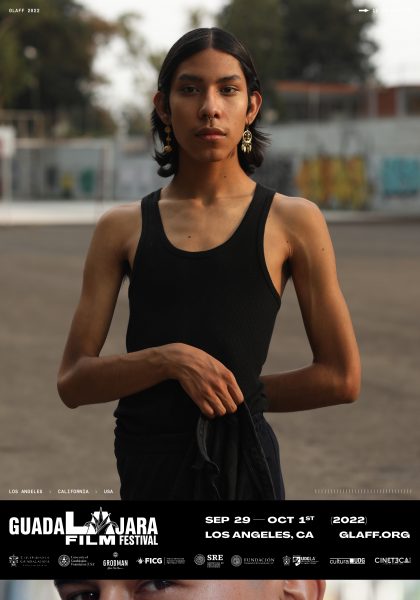
GLAFF is also proud to announce that this year they have teamed up with Mexican artist and photographer Dorian Ulises Lopez Macias, who has designed the official poster of this year’s film festival’s 12th Edition.
GLAFF pays homage to the two cities that saw its inception and growth: Guadalajara, Jalisco, Mexico and Los Angeles, California, USA. GLAFF’s goal is to showcase the best of Latin American, Iberoamerican, Latinx and BIPOC cinema as well as open doors to emerging latino/x/e creators in order to promote a borderless cinematic industry. GLAFF is organized by the Universidad de Guadalajara and Guadalajara International Film Festival (FICG) through the University of Guadalajara Foundation USA, with the support of Legado Grodman.
Tickets are now on sale for the International Film Festival which will take place in downtown Los Angeles Sept. 29th – Oct. 1st
Arts & Entertainment
L.A. Black Pride honors Noah’s Arc TV series with Community Legacy Award
As the show marks its 20th anniversary, it’s returning with a highly anticipated new chapter
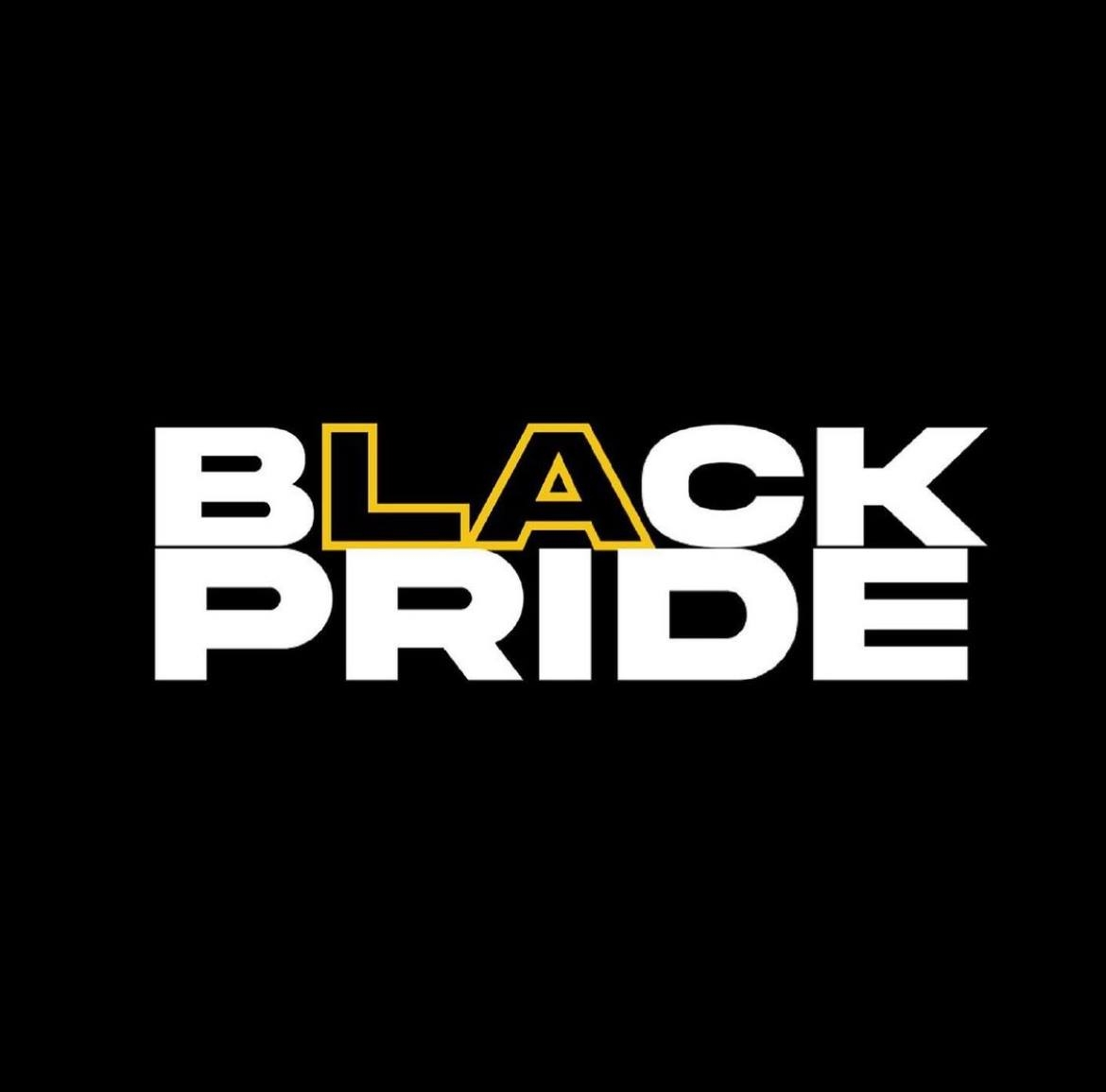
Two decades after Noah’s Arc changed the game for queer, Black storytelling in Hollywood, Patrik-Ian Polk returns to Los Angeles Black Pride for a legacy celebration honoring the sparkling new chapter in the show’s story.
Grab your popcorn…
During LABP’s finale event on Sunday, July 6 at The Abbey, the festival will present its Community Legacy Award to director, producer and trailblazing storyteller Patrik-Ian Polk. Polk is known for creating Noah’s Arc, a show that premiered 20 years ago on Logo TV — the first queer-centered commercial cable network. It’s a more-than-appropriate tribute as Polk’s iconic series helped define Black queer media and its influence remains undeniable today.
“The idea for Noah’s Arc was born over 20 years ago at the opening night party for Black gay Pride in Los Angeles,” recalled Polk. “I was struck with the idea to create a Black gay Sex and the City-type series. I literally declared to myself at that party that I was going to make it happen. I vowed that within one year the show would be a reality. And it was.”
A Polk announced that Noah’s Arc: The Movie, will debut this summer. The reunion is a nostalgic and formidable reminder of how vital Black queer storytelling remains today.
This year, LABP’s programming reflects that vision more than ever. With community panels, wellness activations, art installations and nightlife events curated specifically for Black LGBTQ audiences, the weekend is about visibility and shaping our future.
Part of this future means honoring and celebrating those pioneers who laid the groundwork.
Each summer, thousands of Black LGBTQ folks join together in Los Angeles to celebrate who we are, reclaim space, share our joy and continue to write our communal story. Over the years, LABP has evolved from a weekend of parties, into a powerful cultural movement. It serves up a dynamic blend of celebration, storytelling, wellness and activism that honors every aspect of Black queer life.
LABP is a pulsing and vibrant archive where history is not just remembered but made, where our chosen family comes together and where new generations of creatives, organizers and leaders emerge. Under the guidance of cultural producer Brandon Anthony, LABP has come to be a platform for expression and impact, holding a mic to Black and brown queer voices that are far too often left on the margins of mainstream Pride narratives.
Originally premiering in 2005, Noah’s Arc was the first scripted television series to center the lives of Black, gay men. It was groundbreaking in its portrayal of love, intimacy, vulnerability and friendship. Set against the backdrop of Los Angeles, Noah’s Arc gave us characters who felt real to those watching. For so many, it was the first time seeing themselves fully reflected in television.
“LA has always been a hub for Black queer creativity and culture,” said Polk. “But there are fewer and fewer spaces like that today and fewer events that spotlight our stories in full color. So I’m truly honored to be recognized, and I’m glad to see LA Black Pride and innovators like Brandon Anthony continuing to center and celebrate our community in meaningful ways. It is sorely needed.”
LABP’s commitment to centering and uplifting BIPOC queer narratives is genuine and intentional. As corporate Pride celebrations more often than not lose sight of grassroots needs and at times, reality, LABP’s undertaking is both critical and necessary. Here, heritage and foresight go hand in hand. Through its awards, art-centric events and community programming, LABP celebrates and sustains Black queer voices. For Brandon Anthony, who has reimagined LABP with a focus on accessibility and authenticity — the mission is clear.
“We’re creating the space we’ve always deserved. That means programming that reflects our culture, leadership that reflects our lived experiences, and events that pour back into the community.”
As Black queer youth, elders, artists, and allies come together for this year’s festivities, they do so in celebration, more importantly, in solidarity. LABP is a sanctuary, yes, but it is also a statement.
We are here. We have always been here. And our stories matter.
Polk’s recognition at LABP is a full flex in Black queer history. A show idea that started at a Pride party two decades ago is now being celebrated by the very community that inspired it. And with a new generation of storytellers ready to make their mark. Los Angeles Black Pride continues to champion voices like Polk’s while creating space for the next wave of storytellers to rise by honoring, sharing and supporting their stories. There will be music, mimosas and maybe a few tears of joy along the way.
To purchase tickets or for more information, head to http://losangelesblackpride.org/
Arts & Entertainment
Dances with Films Provide Much-Needed Representation of Queer Films at 28th Annual Festival
The 2025 outing of DWF will play a total of 254 films, with the theme “Find Your Truth,” making this is one of Los Angeles’ largest independent film festivals
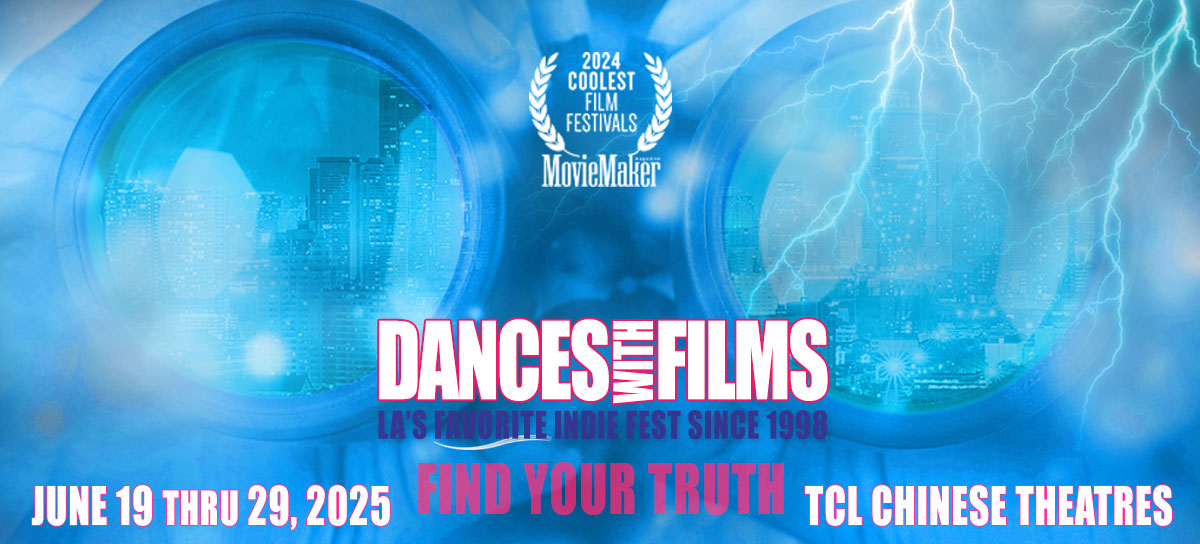
Jackie Tepper, Producing Partner and Documentary Programming Chair for the 28th annual Dances with Films Festival in Los Angeles, is thrilled to have an array of LGBTQIA+ movies and series at this year’s festival.
“We feel that it’s important for the LGBTQIA+ community to be heard, especially now given our political climate,” acknowledged Tepper. “We have always championed these projects, but even more so now. We are proud to shine a spotlight on these amazing films.”
This year, three features, eight shorts, and four pilots will play at the historic TCL Chinese Theatre from Thursday, June 19 through Sunday, June 29. The 2025 outing of DWF will play a total of 254 films, with the theme “Find Your Truth,” making it Los Angeles’ largest independent film festival. A complete list of films and events, the festival schedule, passes and tickets, and more are available online here.
The features slate begins with the World Premiere of Lane Michael Stanley’s “T” on Friday, June 20 at 7:15PM. Filmed over lead actor Mel Glickman’s real-life first year taking Testosterone, “T” is a fictionalized, never-before-seen journey of nuanced transmasculine discovery, authentically portraying the moving struggles and joys encountered in friendships, family, and romantic relationships.
“We are incredibly honored to present such a diverse queer slate each year, added DWF co-founder Michael Trent. “Pride Month is a time of celebration and visibility for the LGBTQIA+ community, and we are so proud to shine a spotlight on these exceptional filmmakers who use their voice and art to promote acceptance and understanding.”
One of the highlights of the festival is the queer comedy TV pilot, “Gasbag,” which had its World Premiere at Dances With Films NYC last December. It screens in Pilots Block 6, Saturday June 28 at 3:30PM.
“Gasbag is the epitome of the scrappy ‘can do’ spirit that Dances With Films celebrates,” said writer and producer Lynn Rosen. “I often write about subjects that mystify me as a way to understand them, and overtalkers like George Nordstrom, my lovable protagonist, fit that bill. So when Covid lockdown struck, I wrote Season 1 for a few theatre friends, including fabulous character actor and co-EP, Chad Kessler, as a way to stay connected and keep our spirits up. We shared this DIY inaugural season with friends as a way to spread the joy we felt making it. People loved George and his band of merry misfits so much we felt we had to make Season 2.”
One notable film in the feature documentary category is Chris Coats’ “FLAMINGO CAMP,” where a group of young queer and trans anarchists create a thriving safe space for themselves in the squatter town of Slab City, known as Flamingo Camp.
The shorts programming kicked off on Friday, June 20 at 4:45 PM in the Documentary Shorts Block 1 with DWF alumna Cheri Gaulke’s LA premiere of the documentary, “Old Girl In a Tutu: Susan Rennie Disrupts Art History,” in which feminist scholar Susan Rennie seizes her iPhone and sneaks her queer, octogenarian body into master works of art, disrupting the narrative of the male gaze.
Head of Narrative Short Film Programming Lindsey Smith-Sands loves the brief glimpse that short films give viewers into other people’s lives.
“One thread throughout the short films this year is finding your true self and LGBTQIA+ stories work well with those themes,” Smith-Sands noted. “The exciting shift is seeing how LGBTQIA+ characters are portrayed in many of these narratives as the confident, assured ones, whereas the other characters are still struggling with who they are.”
a&e features
Los Angeles Black Pride raises community consciousness uplifting Black, queer talent
Here is a slice of Pride rooted in ownership, not optics

When most people think of Pride they more often than not relate it to parades parties. Far too many often forget that it is also a platform. Los Angeles Black Pride (LABP) isn’t just raising the flag. They are raising community consciousness at a time when white, mainstream aesthetic often enjoys borrowing from Black, queer culture without acknowledging the appropriation at hand. LABP does the work to flip the script.
This year, the celebration takes a bold economic stance. Visibility is cute, but viability pays the bills.
BLQ+MKT: Not Your Average Pop-Up
Enter BLQ+MKT, LABP’s unapologetically Black, queer vendor marketplace that’s one part business expo, one part cultural homecoming and all of the parts hustle. It’s not just about selling candles and tees, no matter how hard those candles do slap. It’s about building an ecosystem where Black LGBTQ entrepreneurs are seen and supported. This marketplace is not a low-key side attraction — it’s the main stage for economic empowerment.
By centering queer-owned brands, LABP is addressing a long-overdue market correction. Black LGBTQ folks represent a whopping $113 billion in spending power. That’s not just an audience, it’s a full-on economy. And yet, less than 10% of advertising content reflects this reality. BLQ+MKT says what the mainstream won’t — put some respect and revenue on our names.
Lakeyah: Headliner meets head-turner
Speaking of showstoppers, LABP will feature none other than Lakeyah – rapper, baddie, and blueprint for how queer-centered entertainment can drive community dollars. Her presence isn’t just a vibe, it’s part of a larger economic strategy. When you book talent that reflects the community, you do more than just fill seats. You circulate wealth, amplify voices, and make it very clear who this party is really for. She opens for Saucy Santana at this year’s Saturday night main event.
The Business of being seen
LABP is turning Pride into praxis. By shaping spaces where artistry and ownership meet, they’re shifting the focus from being seen to being paid — and paying it forward. This is about building power without waiting around for permission. Applause is adorable. Ownership changes everything.
Come for the music, the joy, the lewks that will leave zero crumbs. And while partaking in all of the Pride, take a closer look. Every booth at BLQ+MKT, every track Lakeyah drops, carries the architecture of a future rooted in Black queer autonomy. In LABP’s world, Pride isn’t solely a performance. It’s a goddamn power move.
To purchase tickets or for more information, head to http://losangelesblackpride.org/
Events
Join us for Diálogo – “Pride, Power & Progress”
LA Blade partners with CALÓ News and Latino Media Collaborative to present a free Latinx Pride panel on Thursday, June 26 at 6 p.m. at The Abbey in WeHo

You’re invited to Diálogo – Pride, Power & Progress, an intimate evening dinner and conversation taking place on Thursday, June 26, 2025, 6 p.m., at The Abbey in West Hollywood.
An intimate in-person gathering that brings together powerful voices at the intersection of journalism, identity, and social impact.
This monthly Diálogo series is presented by the Latino Media Collaborative (LMC) and hosted by CALÓ News. This month, the Los Angeles Blade joins LMC and CALÓ News to host this event on Pride, power and progress at the intersection of LGBTQ and Latinx issues. The ongoing collaboration between the CALÓ News and LA Blade newsrooms bridges a gap between some of the largest communities across Los Angeles County with the goal of covering issues and highlighting the stories that matter to us.
This special evening will feature a welcome cocktail reception, appetizers and an informal but intentional conversation among local and national leaders in journalism, philanthropy and civic engagement.
Together, we’ll explore the evolving landscape of Latinx journalism and its critical role in advancing equity, representation and lasting social change.
Speakers include Salina EsTitties from RuPaul’s Drag Race, Andrés Palencia, CEO & Co-Founder, LatiNation, Liliana T. Pérez, Sr. Director of Cultural Affairs, L.A. Chargers, Bamby Salcedo, CEO & President, TransLatin@ Coalition and Jorge Reyes Salinas, Communications Director, Equality California.
The panel will be moderated by Los Angeles Blade Editor, Gisselle Palomera, with opening remarks by Los Angeles Publisher, Alexander Rodriguez and Managing Director of Latino Media Collaborative, Esperanza Guevera.
The event is free, RSVP here and follow CALÓ News and Los Angeles Blade on Instagram.
The Abbey: 692 N Robertson Blvd, West Hollywood, CA 90069
Arts & Entertainment
IN PHOTOS: Emily Eizen captures the glam at OUTLOUD
‘This year felt different because we are different. We are more empowered, galvanized and out, louder than ever’

All photos are credited to Emily Eizen for Los Angeles Blade.
WeHo’s Pride last weekend hit off Pride month for everyone across L.A., bringing major headlining acts to our backyard through the OUTLOUD Concert. Conveniently located a few blocks away from my West Hollywood apartment, every year I would hear performances booming from a distance. This year brought a lighthearted revelry of queer music performed by artists who are a part of or allied to the LGBTQ community. However, having inside access thanks to Los Angeles Blade and my dear friend Laganja Estranja (love you sis), I tapped right into the beating heart of West Hollywood, the queer music scene and a deeper sense of community — during a time when our joy and celebration are being banned and demonized. This year felt different because we are different. We are more empowered, galvanized and out, louder than ever.
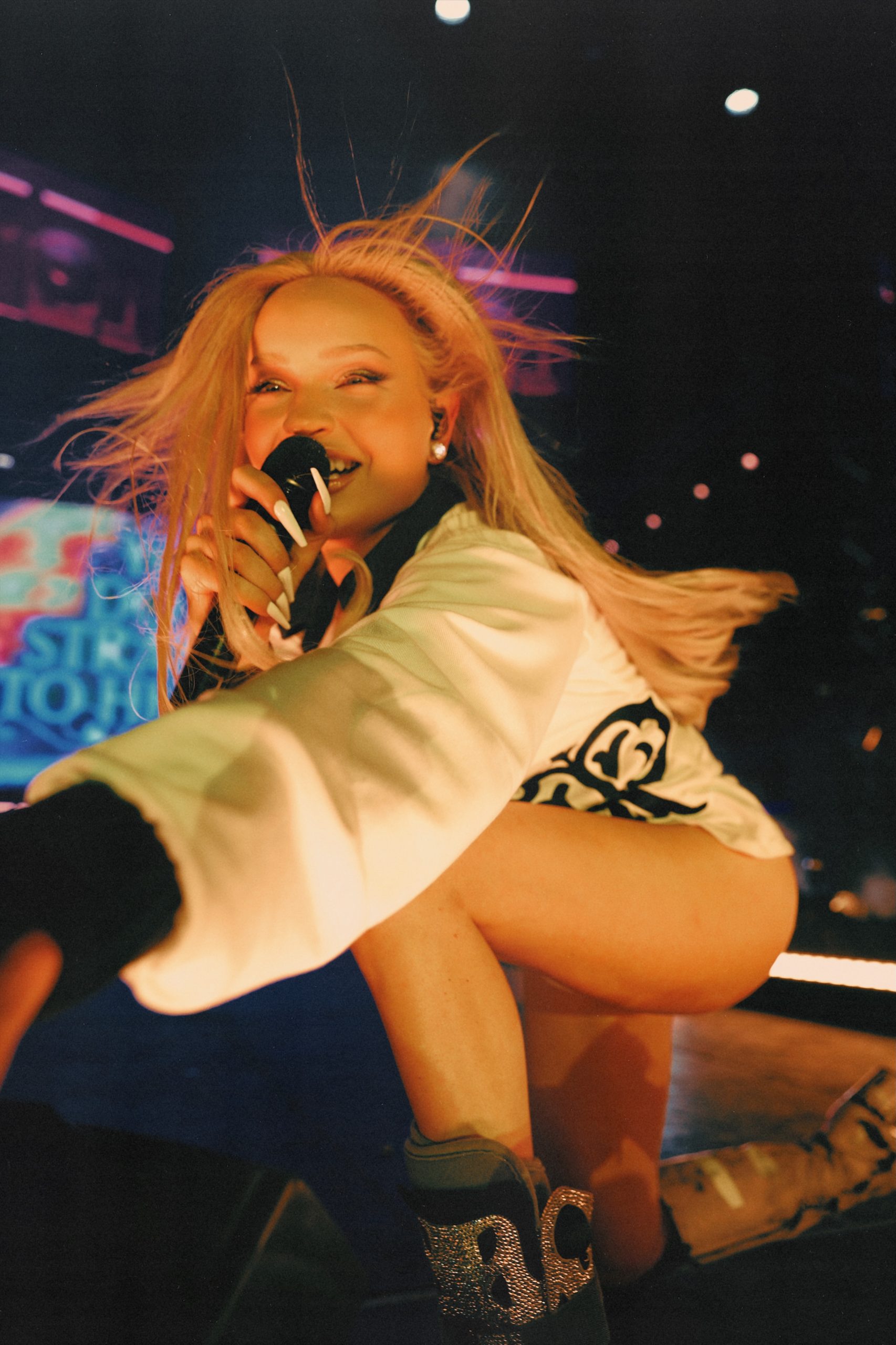
Kim Petras reaches out to fans during her Saturday night set.
Between musical acts and hurried backstage commotion, I found myself dressed in my best finery, with freshly dyed eyebrows and bleached roots to really set it off. While I had my usual pre-show jitters, I actually felt calmer than ever before because I was surrounded by family waiting to be met and connections to be made. Sure enough, with each person I met and asked to capture, a sense of belonging and creativity washed over me.

DJ Hannah Rad pumps up the crowd between sets.
Friday Night, During the Kickoff, Laganja and I kiki’d with lesbian queen Kori King, the “Legs of New York” Lana Ja’rae, and RuPaul’s Drag Race All Stars 10 star Acid Betty. Not to mention the ever present SLAY of the masters of ceremonies Ryan Mitchell and Arisce Wanzer, who flawlessly ushered us throughout the whole weekend, generously offering an introduction or a quick sesh between acts. Qveen Herby closed out the night, reminding the crowd — and myself — that the world needs our art.

Qveen Herby lights up Friday Night.
Saturday was a whirlwind, starting with me meeting pop-rock girlie pop Chrissy Chlapecka, who I captured on my fisheye lens. That session something clicked, I decided I was going to get as many fisheye portraits as I could. Not in a “can I take your photo k-thx-bye” kind of way, but in a “I would love to capture your unique and beautiful slay because I see you” kind of way.

Hip Hop duo FLYANABOSS pose wearing @ColtyLeather.
I linked up with the hiphop powerhouses FLYANABOSS, whose charisma practically shattered my camera. During their set I spotted Veondre Mitchell and I snapped a gorgeous photo of her being a barricade baddie as we exchanged compliments. In the artist area, which started to feel like a mini gay Coachella, I met the electrifying Frankie Grande, and met up with one of my best friends, Luna Lovebad, who happens to be the genius behind my new look.
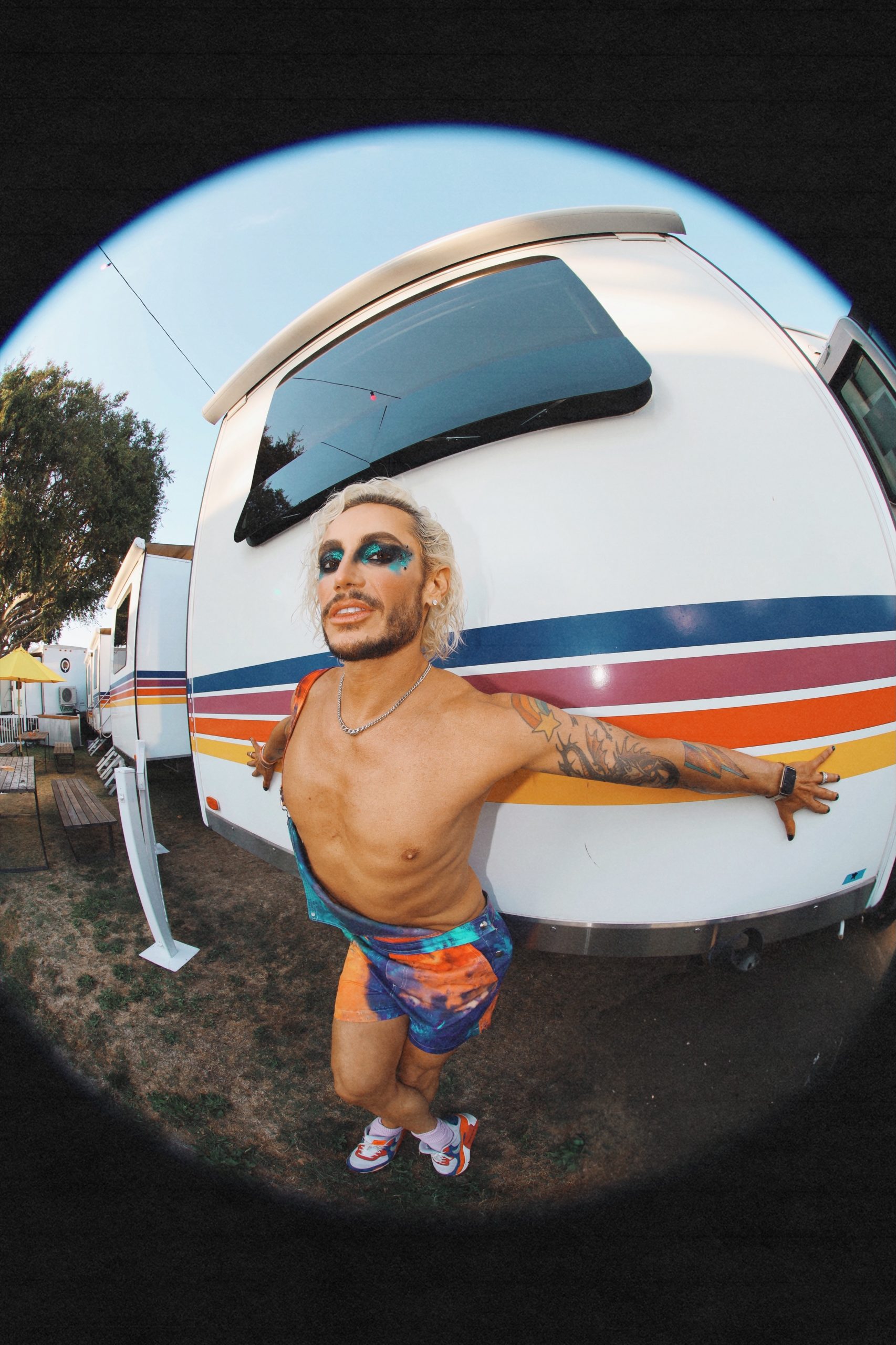
Frankie Grande poses at OUTLOUD festival before performing.
As we hung out by the trailers, Pabllo Vitar emerged in an anime inspired pink butterfly look, with a dozen dancers all dressed in matching pink outfits. She graced me with the opportunity to snap a quick fisheye photo as her team shone the perfect warm lighting for us. Goals.

Luna Lovebad stuns in pink with Labubus to match.
Lastly, the generous king Ryan Mitchell was talking to the one and only Kim Petras and introduced me. Petras was the sweetest and told me I looked cool. I internally screamed, but played it cool and shot some photos of her that may or may not be my current screensaver. After her performance, I floated home on a cloud to prepare for Sunday.

Kim Petras performed new song “Freak It” at OUTLOUD.
I didn’t know how it could get any better, but Sunday proved to be a culmination of the weekend that I never expected. As I mingled by the trailers and sipped my millionth free Red Bull, talent started walking around filming content for the day. I met Corook by the steps, needing to lens their fun personality and style.
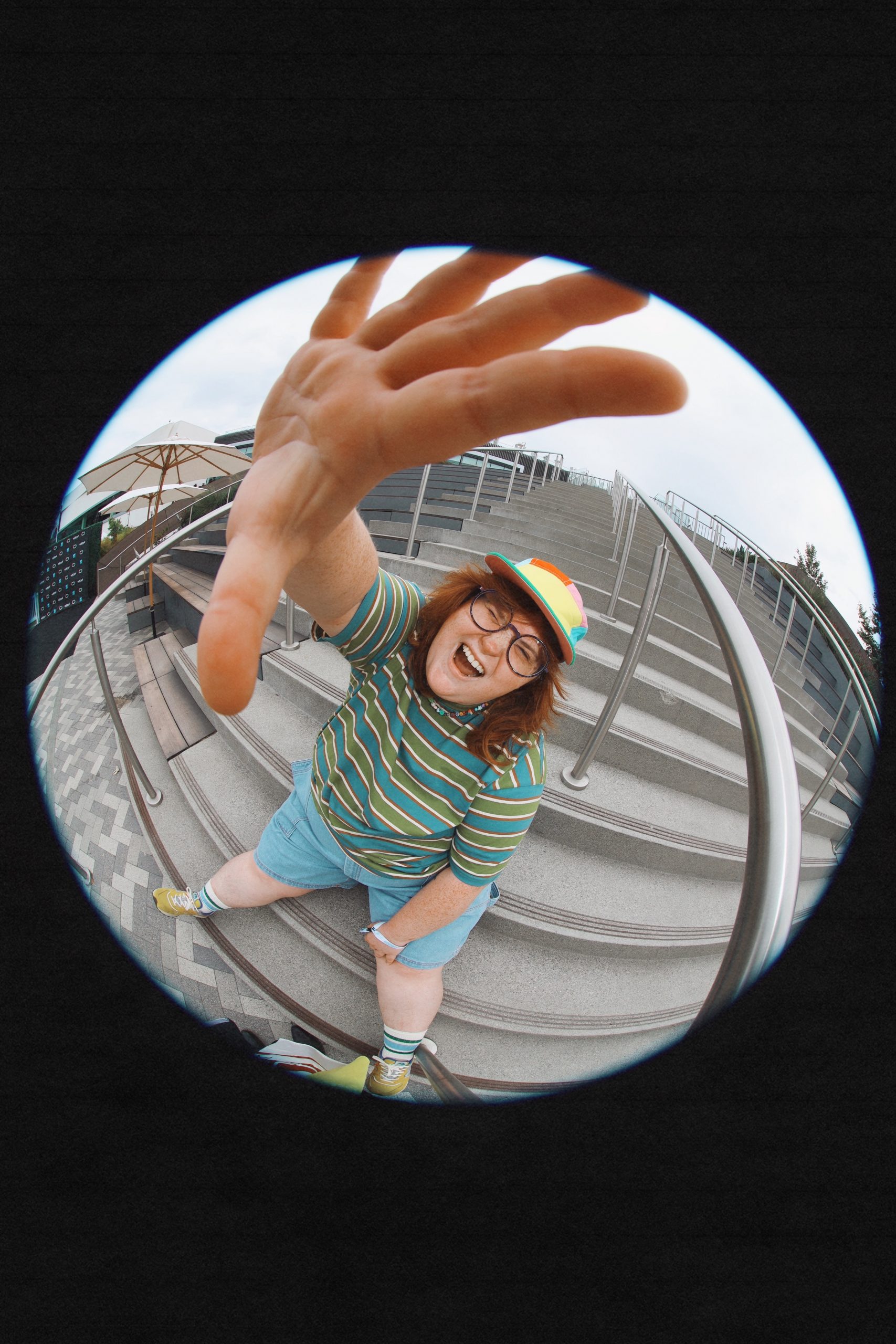
Corook was all smiles backstage before their Sunday set.
Then the world shifted and the ground vibrated with only the energy a mother could bring. Before my very eyes, the queen mother herself, Sasha Colby. I introduced myself and congratulated her on her new cannabis venture, being somewhat of an expert myself. We then talked about my journey from budtender to photographer, and I thanked her for her service (and for existing in our timeline.) Never did I think I’d actually burn one with her. Still processing that. Her performance drew A Listers including the likes of supermodel and activist Cara Delevingne.
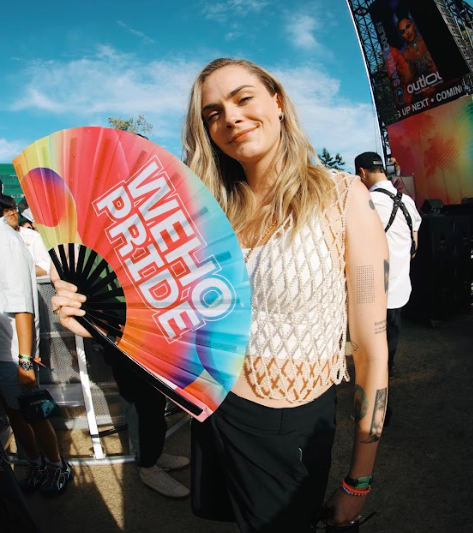
Cara Delevingne at Sasha Colby’s performance.
Then I hung out with Kyra Jete, who I met at the OUTLOUD pride kickoff event a few weeks before. Before her “Club Shy” set, I was lucky enough to capture Shygirl, as I felt a tap on my shoulder. I was asked what I was doing tonight, or if I was free to photograph Remi Wolf. The headliner of WeHo Pride’s OUTLOUD concert.

Remi Wolf headlined OUTLOUD on Sunday, June 1st, ending the night with electrifying glitz and glamour.
Did I just get asked to shoot the headliner of the festival? Well, yes! I met with Wolf for some pre-show portraits and then shot her set, which perfectly wrapped up the weekend with rock and roll that touched the spirit of everyone in attendance.
As I looked through the who’s who of queer musical and drag royalty I had the privilege of capturing during WeHo Pride weekend, it dawned on me that this joy is an act of resistance in itself and I am but an archivist capturing the time I live in.
Yes, Pride started as and always will be a protest and a riot. It is also our art that lives on beyond our time, shining a light for future generations to see how we celebrated our existence in a world that condemns us for it. My hope is that these photos showcase our beauty when we come together as a community filled with talent, love, and beautiful resistance.
Follow Emily Eizen on Instagram for more content.
District of Columbia
Creators on the Frontlines: Inside D.C.’s influencer conference
The conference empowers creators to drive political awareness and action, particularly among young voters whose turnout in recent elections has been alarmingly low

The Trending Up Conference brought together influential digital voices, lawmakers, advocacy organizations and movement leaders to discuss how creators are redefining the political landscape. Last month, over 200 content creators gathered in the nation’s capital, not to chase likes or algorithmic trends, but to take meaningful action in shaping policy.
Through collaborative sessions on topics ranging from the economy and climate change to LGBTQ rights, immigration, reproductive rights, education and disability justice, the conference showcased the powerful role creators play in shaping public discourse. It also provided dedicated spaces for creators and policymakers to work side by side, building connections and strategizing for impactful change.
“The more we collaborate and work together, the more successful we will be in advocating for human rights for everyone,” said Barrett Pall, a life coach and influencer in the queer community.
Rep. Maxwell Frost (FL) the youngest member of Congress, discussed innovative strategies for civic engagement. He emphasized the importance of meeting young voters where they are — through culture, music, and storytelling — to combat political disengagement. Frost, a former organizer and musician himself, has long championed the use of creative platforms to mobilize underrepresented communities and inspire a new generation to participate in the democratic process.
His remarks aligned with a central goal of the conference: to empower creators to drive political awareness and action, particularly among young voters whose turnout in recent elections has been alarmingly low.
Warren emphasized the importance of creators in driving meaningful change.
“You are the people making America’s national conversation. What we’re trying to do here matters, and you’re part of that fight,” urged Sen. Warren, adding that they should recognize their power and responsibility. “If enough of us tell enough stories, we’ve got a real chance to build a country where every kid has a fighting chance.”
She continued by reinforcing the value of our voices.
“This moment is up to you to make the decision,” she said. Warren then asked the audience, “what are you going to do when your country is in real trouble?” Warren’s message was clear: creators are essential in this moment and our voices must be uplifted and leveraged in the fight to reshape the nation for the better.
“We need to find ways to talk to each other across this nation and that conversation starts with all of you,” she said.
Former Transportation Secretary Pete Buttigieg also emphasized the importance of reaching audiences across all platforms.
“Whether it’s going on Fox or going on Flagrant, how can I blame somebody for not embracing the message that I believe in if they haven’t heard it? We’ve gotta be cross-cutting these platforms [or else] no one is persuading anybody,” said Buttigieg.
He believes in meeting people where they are, spreading progressive messaging in language that resonates, and ensuring that those who might not typically hear his message have access to it.
“Democrats used to think that they were the ones who were digitally savvy,” he added. “The algorithm is not neutral.” A recent study revealed that TikTok’s algorithm during the 2024 presidential race disproportionately recommended conservative content — Republican posts received 11.8% more recommendations than Democratic content. This highlights how platforms themselves can skew the political narrative, further underscoring the necessity for creators to actively push back against these digital biases.
“What we build next has to be different from what we inherited,” Buttigieg said. “You are at the very heart of that — that’s why I’m here today.”
While Buttigieg advocates for engaging across platforms, California Governor Gavin Newsom’s approach has raised concerns. Instead of using his platform to meet a broad spectrum of voters, Newsom has recently chosen to amplify far-right voices. His decision to invite extremist figures like Charlie Kirk and Steve Bannon onto his podcast under the guise of creating a “middle ground” is deeply troubling. At the same time, Newsom — who once championed California as a sanctuary for transgender youth and a defender of inclusive education—has taken a stance against transgender women and girls competing in female sports, calling it “deeply unfair.”
“I think it’s an issue of fairness. I completely agree with you on that. It is an issue of fairness, it’s deeply unfair. We’ve got to own that. We’ve got to acknowledge it,” he told Kirk. This capitulation to conservative talking points doesn’t just undermine his past work—it emboldens those who are trying to dismantle hard-won rights.
At Trending Up, creators pushed back against this political drift by meeting directly with California representatives to discuss urgent social issues — including threats to Medicaid, the pink tax, disability rights and the disproportionate impact of billionaire tax breaks. Across these conversations, one thing was clear: creators are not just influencers. We are educators, mobilizers and trusted voices in out communities, capable of translating policy into stories people care about.
Tiffany Yu reflected that Rep. Sydney Kamlager-Dove’s presence alone spoke volumes: “Her showing up to create content with us meant that she understood we as creators are more than just influencers — we’re mobilizers and educators.” Ashley Nicole echoed this sentiment after meeting with Speaker Nancy Pelosi.
“When people know, they will resist — but they have to know about it,” said Nicole. That quote stuck with me because it highlights how important it is to get information in front of people in a way they can connect with.”
Loren Piretra emphasized the urgency of economic justice: “We talked about the billionaire tax breaks…and how most people don’t realize they’re closer to being unhoused than to being billionaires.” Meanwhile, Nikki Sapiro Vinckier described her conversation with Rep. Ami Bera as a rare moment of digital fluency from an elected official.
“His willingness to engage on camera signals that he sees value in creator-led political communication, which isn’t always the case.”
These interactions underscore the evolving role of content creators as vital conduits between policymakers and the public. By translating political complexity into accessible, engaging content, creators aren’t just informing their audiences — they’re mobilizing them toward meaningful civic engagement.
In a media landscape dominated by far-right outrage and rampant disinformation, creators using their platforms for good are a powerful counterforce—reclaiming truth and championing the issues that matter most. While extremist voices often dominate the conversation, the majority of Americans stand with the progressive causes creators at Trending Up are fighting for: reproductive rights, LGBTQ protections, and climate action. It’s time for elected officials to stop pandering to the far-right and start amplifying the voices of the people driving change.
This moment demands more than political compromise — it calls for bold leadership that empowers creators who are already shaping a better future. Uplifting these voices is not just strategic; it is crucial for protecting democracy and ensuring that progress, not division, is at the heart of our nation’s political discourse.
Arts & Entertainment
Grace Jones: The Voice of Queer Revolution
Deity of disco, gender outlaw and living myth, Grace Jones to headline Blue Note Jazz Festival on Sunday, June 15 at The Hollywood Bowl

If queer culture itself had a Mount Rushmore, Grace Jones would be carved in obsidian, glowing like a disco ball, with cheekbones sharp enough to slice through time. She is no mere performer — she is a provocation, a movement, a fierce force to be reckoned with. This June 15, at the iconic Hollywood Bowl, Miss Jones takes the stage once more — not as a nostalgia act, but as a living, breathing beacon of artistry, abounding soul and queer defiance.
It’s only appropriate that Jones headlines the Blue Note Jazz Festival, a space known for legends and nonconformists alike. Because that’s what she’s always done: bend genre, bend gender and bend the very idea of identity. Long before the mainstream caught up with conversations about fluidity and expression, Jones was already there, prowling through Studio 54 in Issey Miyake couture, turning disco into performance art, queering fashion and queering music simply by refusing to be anything but herself.
In the late 70s, New York nightlife was church and Jones was its high priestess that the disciples of disco and dance bowed down to. Her early hits like I Need a Man and La Vie en Rose weren’t just dance floor anthems to get down to — they were declarations of an unapologetic presence. She became the face of a new sect of glamour — androgynous, untamed and transcendent. With her sleek flat-top and surreal persona, she turned herself into a living sculpture — black, bold and utterly uncategorizable. While others played roles, Jones crafted her own mythos.
Without a doubt, the queer community took notice of her magnetism. Not just because she radiated. Not just because she could command a stage in heels taller than their dreams. They took notice because she embodied the purest form of liberation. She was dangerous, defiant, and divine. The kind of icon you didn’t just admire but you emulated. To be queer in the shadow of Jones was to know that defiance could be not just sexy but sacred, that identity could be art.
Her influence transcends both decades and genres. Nightclubbing, Warm Leatherette and Living My Life didn’t just experiment — they shattered expectations. She sang Joy Division like a glistening goddess and made Sting’s Demolition Man sound like a god damned prophecy. Songs like Pull Up to the Bumper weren’t just hits, but cultural cataclysms. Even now, Beyoncé’s invitation to Grace on Renaissance resonated less like a feature and more as a coronation.
The most inspiring aspect about Jones is that she’s never been part of the machine. She is the machine. A postmodern construct of fashion and fearlessness in the funkiest of forms. Her 2008 album, Hurricane and her 2014 memoir, I’ll Never Write My Memoirs, unearthed a soul as deep as her basslines. She told the world how she turned religious repression into self-made divinity. Jones danced with Leary, painted with Warhol and eviscerated the boundaries of possibility.
And now with her show at the Hollywood Bowl, Jones arrives not as a relic, but as a reckoning. For queer folks, especially our Black queer queens, kings and all of that royalty in between, Jones represents more than just music. She is the liberation incarnate. She is proof that our futures can be as extravagantly ungovernable and as radiant as we want to make it. Jones is not the past nor the future. She exists beyond our mere three dimensions and linear concept of time. She is pure unfiltered prophecy.
When she steps onto that stage lit like the Phoenix that she is, we won’t just be witnessing a performance. We’ll be honoring Queer legacy. And, if we are lucky, we will get a taste of whatever the next version of Jones is evolving into. She evolves, reinvents, reclaims — and in doing so, reminds us that we can, too.
Grace Jones will headline The Blue Note Jazz Festival on Sunday, June 15 at The Hollywood Bowl. Click here for tickets.
Events
Right Before I Go: Danny Pintauro on mental health, survival and speaking up
As Mental Health Action Day approaches, Pintauro’s message is simple but vital: start the conversation

Actor and advocate Danny Pintauro is not one to shy away from a difficult conversation and with his latest project, he’s diving right into one.
Starring in the benefit reading of Right Before I Go for Mental Health Action Day, Pintauro isn’t just lending his voice to a powerful script — he’s putting his own lived experience on the front lines of a conversation that, quite honestly, needs to happen. With a cast full of talent, a story grounded in authenticity and truth, and a discussion that promises real dialogue, this is not just a night at the theater but a call to action.
We were fortunate to have the opportunity to connect with Pintauro and talk about what drew him to this project, how his own journey informs his advocacy, and why we all need to ‘kiki less, talk more.”
Spoiler alert: things get honest, unfiltered, and refreshingly hopeful.
You’re starring in the benefit reading of Right Before I Go for Mental Health Action Day. What drew you to this particular project?
Stan Zimmerman, the creator of this piece, sent the script to me quite a while ago and I was intrigued after reading. So we’ve been waiting for an opportunity to work on this together. The timing is perfect with May 15 being Mental Health Action Day. The Curtis Theater in Brea is also very hands on with this piece and is providing a mental health professional for the talk back after the show. To work with Mindy Sterling, Juliana Joel, Philip Smithey and Kalinda Gray — is a dream.
The play is built around the true story of Stan processing the loss of his friend Kevin from suicide and how that journey of understanding led him to read numerous notes that various people, both famous and not, have left behind. While telling his story, the other four actors, including myself, read the various letters that impacted Stan the most. This play is an opportunity to get people thinking about suicide and mental health, and any opportunity to affect even a small group of people in this way is important. Safe spaces are important and we’re going to provide one on May 18.
As someone who’s been open about your own health journey, how does this play resonate with your personal experiences?
Look, we’ve all had a moment in our lives where things were so bad, ending your life seemed like the only way forward. If someone tells you they have never had that moment they’re lying. That moment when you are convinced the only solution in front of you that makes sense is to not be alive anymore. I have had multiple instances in my life where it was right there, right on the tip of my tongue. Whether it be in my early 20s when I was outed by the Enquirer, my late 20s when I found out I was HIV positive, or my early 30s when I filed for bankruptcy and felt completely lost.
We’ve all been there, we just — we have to start talking about being there, share the journey with others- that’s the fastest way for us to make change.
According to the CDC, nearly 49,000 people died by suicide in 2023 — that’s one every 11 minutes in the U.S., with the numbers being disproportionately higher for minority groups. The Trevor Project reports that 18% of LGBTQ youth attempted suicide that year, with trans individuals being 72% more likely to do so.
What if removing stigma created safe spaces — starting with ourselves — that allowed people to talk before it’s too late? Just opening up in our friend groups could make a world of difference, especially for young LGBTQ people who might feel seen and supported for the first time.
Depression is a major driver of suicide, but anxiety plays a huge role too. Think about it —suicide can feel like a form of relief when fear and panic become unbearable. My husband, for example, has severe anxiety and claustrophobia on airplanes. When stuck on a tarmac too long, his panic gets so intense that his brain starts convincing him the only escape is to end his life. He’s logical, emotionally stable, and still this happens. That’s how powerful anxiety can be—and why we have to talk about it more. Kiki less, talk more.
In the past, you have always been open and honest about the challenges of living with HIV and overcoming addiction. How have these experiences impacted your approach to mental health advocacy?
As I mentioned, finding out I was HIV positive in 2003 was rough. At the time, we barely understood what the future looked like for people on medication and the drugs themselves were still harsh on the body. There weren’t many examples of people living full, happy lives with HIV — it felt like a death sentence. On top of that, I also contracted Hep C, which can accelerate HIV progression. I truly believed my time was limited. Thankfully, my Hep C resolved itself, but that initial realization — that I’d need to take a pill every day or die — sent me into a tailspin that brought me inches from suicide.
Addiction and mental health[care] are just as tightly connected. One rarely exists without the other and both carry heavy stigma. Talking about either can change how people see you, which is why it’s critical we create a culture of understanding and compassion. We’ve come a long way, but in 2025, it’s still shocking how much judgment exists around suicide, addiction and even depression.
We have to do better.
Right Before I Go digs deep into heavy themes of suicide and mental health. What message do you hope audiences take away from this performance?
You’ll find the keyword of this interview will be action and how we must all take action when it comes to mental health. For our own sakes and for those around us. We must all reach a place where speaking openly and honestly about our personal struggles is easy and we feel heard. That requires education, for both the person suffering and those around them.
So, this play will hopefully give people who are struggling, a safe space to speak about it [during the talkback portion after the play]. [This part] will also get the audience members thinking about who in their lives might be struggling and maybe help them understand why they are struggling in the first place, or even help them understands what the signs are. So few people talk openly about suicide, we are left to read the signs.
Lastly, yes, the play is specifically about suicide, but suicide is a byproduct of mental health and we need to remember that mental health is intrinsically tied to overall health. Everyone can agree that poor mental health leads to poor physical health, both in the short term and long term. I experience this on a daily basis — my anxiety can get so severe that my doctors are worried I will develop ulcers. And if you believe in energy, having your body flooded with the negative energy your mind is creating throughout the day is sure to affect your health. So we all need to take action to make sure our brains are cooperating as fully as possible. What does ‘action’ look like for you? Therapy? Medication? Both?
You’ve been a vocal advocate for de-stigmatizing HIV. How do you see the parallels between the stigma surrounding HIV and that of mental health issues?
They used to be inseparable. Thankfully we have come so far with HIV treatments that we can finally separate the two – through research and through meeting others living happily with HIV you can reach a place where any misgivings, worries or fears can be put away in a box and burned. Every time I encounter someone on my live streams or in my messages who is in a dire state about their HIV diagnosis, it becomes clear right away that they haven’t done their research and are simply living in the stigma.
To be clear, I’m not judging them for not having done their research. I’m simply acknowledging that the act of finding out your positive is so overwhelming and intrinsically tied to shame and fear, you don’t know what to do. Ten years ago, I was always hopeful and positive when responding to people who had just found out. Now I can tell someone with confidence that they can and will live a happy healthy life, even with HIV. The fear dissipates quickly once they realize that taking their medication, as prescribed, will allow them to live long lives — I mean, I’m 20 years positive and in the best health of my life. Learning that (U=U) is real and viable and that taking PrEP can prevent transmission and can remove the shame surrounding being sexually active again. Meeting others who are living full lives should clear any remaining stigma.
That’s when you ‘pop out and into’ your new world with a new passion for life. That’s my personal mantra for a lot of things, when I find myself worrying about my acting career for instance — I try to ‘pop out’ of the negative mindset and ‘pop into’ my manifestations or the very least, ‘pop into the present moment.’
What role do you believe the entertainment industry plays in shaping public perceptions of mental health?
As I’ve always believed, the entertainment business creates opportunities to change public perception every day. I said 100 times already that one of the ways to end stigma and bring mental health issues more to the forefront is through education. But not everyone is going to pick up a pamphlet and decide to become more educated about suicide or depression — at least not until they’re faced with it personally.
But those same people are watching more and more film, TV and social media and if we present them with honest, real and relatable examples of people with suicidal tendencies, depression, mental health issues, etc… while also presenting them with examples of how to help those people — bam, they’ve become educated.
I’ve been saying this since 1997 about the LGBTQ community — one of my jobs in coming out was [and] is to be an honest, real and relatable example of someone who is gay. The more examples, the more acceptance, education and understanding.
Right now, one of the things we are not seeing much of at all in film and TV are people living happily with HIV and having sex. We need to start seeing more examples of this [because] it will help everyone understand and learn. It will make it easier for people just finding out to move through the stigma, it will show how far we’ve come and it will educate people.
I constantly have people ask me how I’m ‘doing.’ And it’s always clear they actually mean, ‘I know you’re dying from HIV, how long do you have?’ If we can start showing people that we are doctors, nurses, teachers, politicians, parents and friends, we can get them to believe we’re not all dying. The only difference between you and me is that I have to take a pill every day, hell, some people get a shot every three months now, that is truly the only difference in our daily lives.
Given your diverse career, from acting to animal rescue, how do you balance your personal passions with your advocacy work?
You know, I wish I could say I was more of an advocate. I wish I was more like Alyssa Milano or Wilson Cruz, just every day taking on the challenges of being vocal about multiple causes. Compared to them, it really feels like I’m not doing anything, It’s also hard to be as prevalent as they are when your daily life is filled with so much uncertainty.
Since coming back to the entertainment business in 2022, I have had minimal success due to everything that’s affected the business since then. I know success is just around the corner for me. I can feel it — but right now we worry about paying our bills, not so much about being an advocate. I think just existing in this world as an example of a healthy, happy HIV [positive] gay man with addiction issues, is going to have to be enough for now.
For people struggling with mental health challenges, what advice would you offer based on your own journey?
My journey is unique, and while I’m not a mental health professional, I always encourage anyone struggling to seek real help because it’s easier than ever to find. What I can share is what’s worked for me.
I talk about this a lot during my TikTok lives: you’ve got to live in the present. That’s one of the main reasons I’ve survived everything I’ve been through. I’m great at letting go of the past, but my anxiety keeps me living too far in the future. Staying grounded in the moment takes work — deep breaths, mindfulness, and yes, therapy.
When I feel myself spiraling, I remind myself: in five years, I don’t want to look back and regret wasting time stuck in a mental health hole. While it’s not always easy to spot when you’re slipping, the key is awareness — what I call my mantra: ‘pop out and pop into.‘ Be conscious enough to pop out of destructive thoughts and pop into the present. Grieve, process, heal — but then live.
Because you’re the only one you truly need to live for.
If you’re stuck in the past or paralyzed by the future, find a therapist. If your mental health isn’t where you want it to be, talk to a doctor about medication. And yes — that stigma still exists. Why is it so taboo to say [to yourself], ‘my brain needs help and I’m choosing medication so I can fully live?’
Our brains aren’t perfect — some need support. That’s not weakness, it’s wisdom.
To my trans brothers and sisters: I see you. I hear you.
According to The Trevor Project, suicide attempts among trans and nonbinary youth rose by 72% in the wake of anti-trans legislation. I know what it’s like to not feel safe — I came out at a time when being openly gay was a radical act. We’ve made huge strides, but our trans friends don’t always have the same safety. We must protect them.
We lost a trans friend in Austin this year. It hurts and I can’t help but think — if the political climate were different, maybe they’d still be here. But we will get through this. When I came out, we barely had two gay characters on TV. Now queer people are everywhere on screen — and that visibility saves lives. So stay visible. Stay here. It does get better.
Looking ahead, how do you envision continuing to contribute to mental health awareness and support?
Hopefully by continuing to read this play in other places around the country. But it will not be hard for me to always be vocal about mental health considering I suffer from it. That’s really the key, people need to talk more openly and freely about their mental health issues — to breakdown stereotypes, to help others see they are not alone, to learn more about yourself — all of it.
What do you hope people remember about your involvement in Right Before I Go and your advocacy efforts?
I hope that people remember the collective moment we get to have after the show in our talk back – that’s where the real work begins!
Right Before I Go: Curtis Theatre, Sun, May 18th, 2025 at 5:00 pm: Tickets Here
Arts & Entertainment
Q Con returns to West Hollywood for its fourth year
SoCal’s Only LGBTQ Comic Convention Takes Over Plummer Park
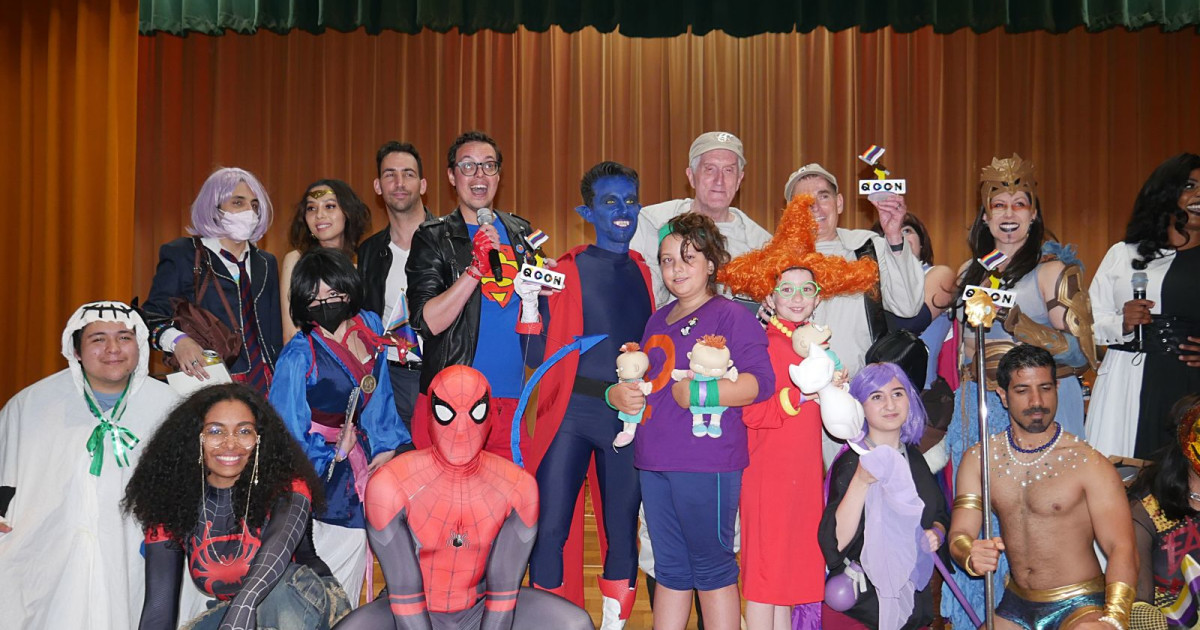
The LGBTQ Comic Con event returned for its fourth iteration last weekend at WeHo’s Plummer Park, with Prism Comics — a nonprofit that spotlights LGBTQ artists — once again hosting Southern California’s newest Queer comic convention. This free, day-long event has become a mainstay for local communities; each year brings together countless comic book creators, visual artists, industry professionals, and more in celebration of LGBTQ fandom today.
From insightful panels to dozens of distinctly talented vendors, interested guests could spend hours roaming the aisles learning how each creator spotlights their community through art.
“I loved being surrounded by other Queer artists and being able to share my work with so many people,” said Deja Prieto, an LA-based illustrator who spent Q Con selling paintings that explore the complexities of female expression through sapphic relationships. “Representation for queer and BIPOC folks in comics is something that the world needs more of, and being able to support creators directly is what makes Q Con truly special.”
Prieto wasn’t the only person proud to share their art with the convention. There were Drag Queens decked out in Deadpool costumes, cosplayers dazzling with their intricate creations, and many fans thrilled to show off their passions to the equally excited attendees around them.
Yet, underlying all of this visual exhilaration was the message that Q Con is based on: comics and fandom have always been essential to the LGBTQ+ rights movement.
This shone through most in the day’s many panels. Whether it be deep-dives into how the X-Men represent modern-day discrimination or conversations about how cosplay helps people find their authentic selves, these hour-long discussions were as enlightening as they were intriguing. One of the true stand-outs was Queer Comics and Resistance, a panel that saw comic legends like LA’s very own Sina Grace discuss how the medium has been utilized to fight back against discrimination.
They spoke about things like the historic use of zines in advocacy, portraying transgender characters when no other medium would, and the countless ways comic creators have worked to grant LGBTQ communities the respectful portrayals they deserve. It was an illuminating conversation for all, and it provided an in-depth understanding that made the entire day feel so much more significant.
Above all else, Q Con was a fun time for all. The crowd’s excitement was tangible, with people you would usually see dancing the night away at Revolver, giddily decked out in dazzling costumes and posing with kids whose parents saw Q Con as the fun event it has proven itself to be.
Combine this with the many LGBTQ vendors in attendance and the day was not only a joyful way to support Queer art, but a reminder of the many people fighting for this community in uniquely powerful ways today. It was a cavalcade of Queerness that reminds everyone about how valuable “nerdy” spaces like these are to the LGBTQ rights movement.
With the assurances from its hosts that this is only setting up an even bigger convention in 2026, West Hollywood locals can be glad that they have a new, annual fixture to look forward to each year.
California
Long Beach Pride reaffirms community focus for this year’s festival
This year’s theme is ‘Power of Community’
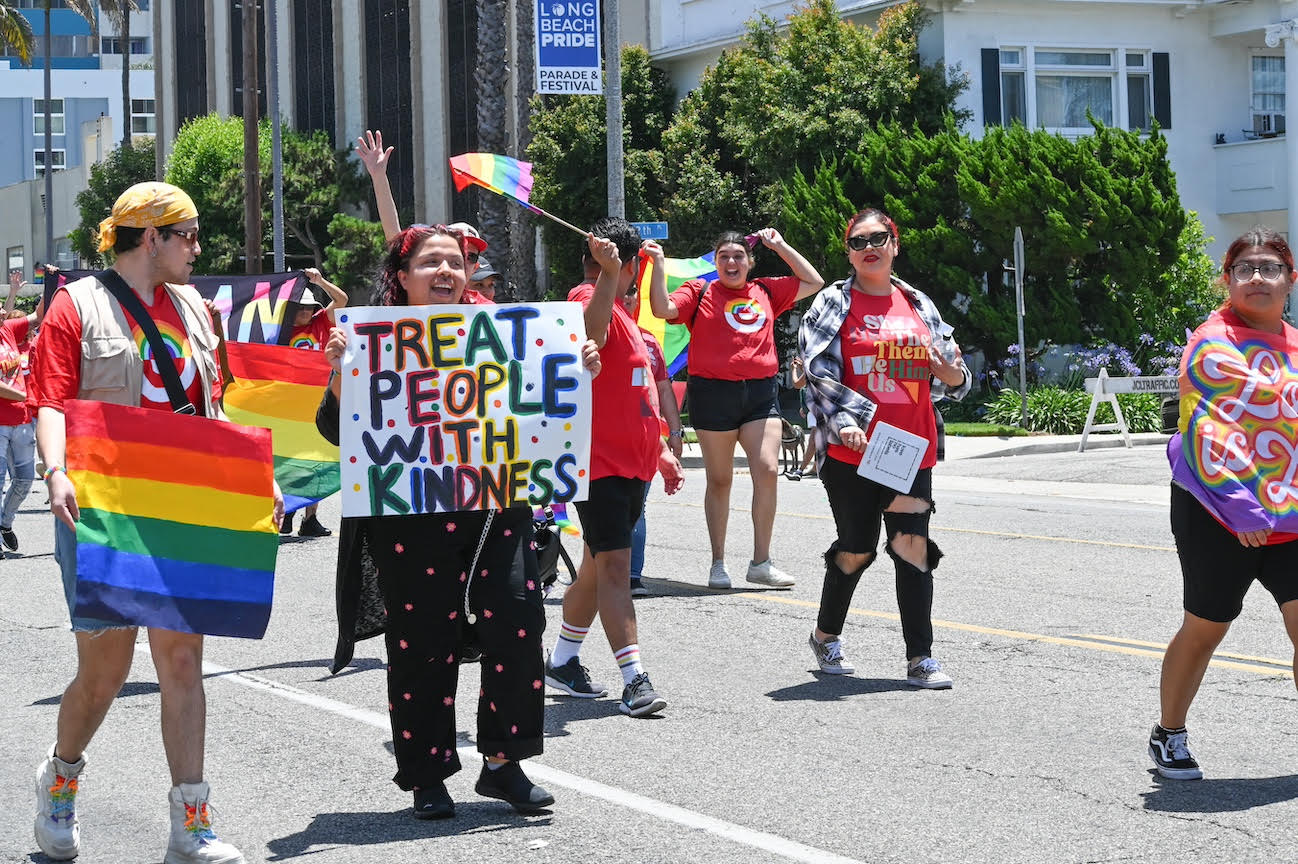
Long Beach Pride 2025 will take place on May 17 and 18 at Marina Green Park, emphasizing focus on grassroots organizations and local community performers.
“Long Beach Pride has always been more than just a festival—it’s a movement,” said Elsa Martinez, interim president of LB Pride. “This year, more than ever, we’re celebrating the strength, creativity, and unity of our local community.”
Martinez also notes that all the ticket sales directly go toward funding on-the-ground resources.
“As a nonprofit organization, every aspect of the Pride Festival—from ticket sales to vendor partnerships—directly funds our work in the community,” noted Martinez. “This is a festival with purpose.”
As LB Pride amps up for its 42nd annual celebration, the organization has stated that this year marks the return to the roots of Pride. LB Pride stated that they are committed to emphasizing what makes the local community so special and spotlighting local performers, musicians and entertainers.
The organization has also stated that they are committed to ‘justice, inclusion, and the celebration of queer joy.’
“Our strength has always been our solidarity,” said Martinez. “This year’s festival is a reminder of what we can achieve when we lift each other up.”
This year, the main stage will feature a lineup of pop, Hip-hop and Latin talent.
Performers include HYM the Rapper, George Michael Reborn Tribute, Tori Kay, Jewels Drag Show Extravaganza, Secret Service, Tiancho and music mixes by DJ BSelecta, DJ Icy Ice and DJ 360.
For updates, tickets, and volunteer opportunities, please visit https://longbeachpride.com and follow @LongBeachPride on social media.
-
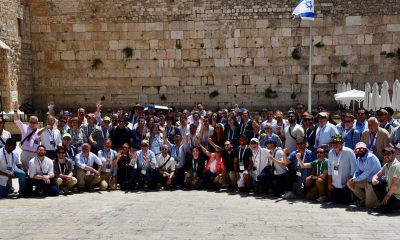
 Viewpoint4 days ago
Viewpoint4 days agoI’m a queer Iranian Jew. Why I stand with Israel during this conflict
-

 Congress4 days ago
Congress4 days agoWhite House finds Calif. violated Title IX by allowing trans athletes in school sports
-

 News5 days ago
News5 days agoDrama unfolds for San Diego Pride ahead of festivities
-

 Breaking News3 hours ago
Breaking News3 hours agoMajor victory for LGBTQ funding in LA County
-

 Books2 days ago
Books2 days agoTwo new books on dining out LGBTQ-style
-

 a&e features3 days ago
a&e features3 days agoLatina Turner comes to Bring It To Brunch
-

 Television3 days ago
Television3 days ago‘White Lotus,’ ‘Severance,’ ‘Andor’ lead Dorian TV Awards noms
-

 El Salvador8 hours ago
El Salvador8 hours agoLa marcha LGBTQ+ desafía el silencio en El Salvador

